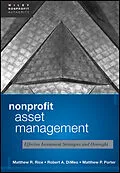An authoritative guide for effective investment management and
oversight of endowments, foundations and other nonprofit
investors
Nonprofit Asset Management is a timely guide for managing
endowment, foundation, and other nonprofit assets. Taking you
through each phase of the process to create an elegant and simple
framework for the prudent oversight of assets, this book covers
setting investment objectives; investment policy; asset allocation
strategies; investment manager selection; alternative asset
classes; and how to establish an effective oversight system to
ensure the program stays on track.
* Takes you through each phase of the process to create an
elegant and simple framework for the prudent oversight of nonprofit
assets
* A practical guide for fiduciaries of endowment, foundation, and
other nonprofit funds
* Offers step-by-step guidance for the effective investment
management of assets
Created as a practical guide for fiduciaries of nonprofit
funds--board members and internal business
managers--Nonprofit Asset Management is a much-needed,
step-by-step guide to the effective investment management of
nonprofit assets.
Autorentext
MATTHEW R. RICE, CFA, CAIA®, is Chief Investment Officer and a Principal at DiMeo Schneider & Associates, LLC, a Chicago-based investment consulting firm that oversees more than $35 billion in institutional and high-net-worth investment assets. He is a coauthor of The Practical Guide to Managing Nonprofit Assets (Wiley).
ROBERT A. DiMEO, CIMA®, CFP®, is the Managing Director and cofounder of DiMeo Schneider & Associates, LLC. He has been featured in prominent publications such as the Los Angeles Times, Crain's Chicago Business, and Pensions & Investments and is coauthor of numerous books, including The Practical Guide to Managing Nonprofit Assets (Wiley).
MATTHEW P. PORTER, CIMA®, is Director of Research Analytics and a Principal at DiMeo Schneider & Associates, LLC. He has served as consultant to a number of nonprofit and corporate clients and is coauthor of The Practical Guide to Managing Nonprofit Assets (Wiley).
Zusammenfassung
An authoritative guide for effective investment management and oversight of endowments, foundations and other nonprofit investors
Nonprofit Asset Management is a timely guide for managing endowment, foundation, and other nonprofit assets. Taking you through each phase of the process to create an elegant and simple framework for the prudent oversight of assets, this book covers setting investment objectives; investment policy; asset allocation strategies; investment manager selection; alternative asset classes; and how to establish an effective oversight system to ensure the program stays on track.
- Takes you through each phase of the process to create an elegant and simple framework for the prudent oversight of nonprofit assets
- A practical guide for fiduciaries of endowment, foundation, and other nonprofit funds
- Offers step-by-step guidance for the effective investment management of assets
Created as a practical guide for fiduciaries of nonprofit fundsboard members and internal business managersNonprofit Asset Management is a much-needed, step-by-step guide to the effective investment management of nonprofit assets.
Inhalt
Preface xi
Acknowledgments xv
CHAPTER 1 The Three Levers and the Investment Policy 1
The Three Levers 1
Investment Policy Statement 5
Statement of Purpose 6
Statement of Objectives 6
Liquidity Constraints 8
Unique Constraints or Priorities 10
Investment Strategy 11
Duties and Responsibilities 14
Investment Manager Evaluation 15
Conclusion 16
CHAPTER 2 Asset Allocation 17
Modern Portfolio Theory 17
Capital Market Assumptions: The Building Blocks of Portfolio Construction 20
Shortcomings of Modern Portfolio Theory 20
Probabilistic Optimization ModelsThe Frontier EngineerTM 24
In the Long Run . . . 26
Strategic, Tactical, and Integrated Asset Allocation Steering Mechanisms 27
The Low Volatility Tailwind 29
Tail Risk Hedging 31
Counterparty Risk 33
Portfolio Rebalancing 34
Conclusion 38
Notes 38
CHAPTER 3 Traditional Global Financial Asset Classes 39
Global Fixed-Income Asset Classes 39
Global Equity Asset Classes 55
Conclusion 59
Notes 59
CHAPTER 4 Traditional Asset Class Manager Selection 61
Manager Search and Selection 61
Investment Vehicles 67
Active versus Passive Management 68
When to Terminate a Manager 70
Conclusion 72
CHAPTER 5 Hedge Funds 73
The Evolution of Hedge Funds 73
Modern Hedge Fund Strategies 74
Why Invest in Hedge Funds? 78
Alpha-Beta Framework, Hedge Funds, and Fees 85
Hedge Fund Indices and Benchmarks 87
Hedge Fund Terms and Structures 88
Fund of Hedge Funds versus Direct Investment 89
Hedge Fund Investment Due Diligence 90
Hedge Fund Operational Due Diligence 92
Hedge Funds in the Post-2008 World 93
Conclusion 94
Notes 94
CHAPTER 6 Private Equity 95
Private Equity Investment Strategies 95
Why Invest in Private Equity? 98
Structure and Terms 99
Private Equity Risks 100
Direct Private Equity versus Private Equity Fund of Funds 101
Selecting Private Equity Managers 102
Benchmarks 102
Conclusion 103
Notes 103
CHAPTER 7 Real Assets 105
Commodities 106
Equity Real Estate Investment Trusts and Private Real Estate 108
Farmland 109
Energy Infrastructure Master Limited Partnerships 111
Broad Infrastructure Investing 112
Timberland 113
Gold 115
Other Investible Real Asset Categories 116
Conclusion 117
Note 117
CHAPTER 8 Performance Measurement and Evaluation 119
Why Monitor Performance? 119
Performance Calculations 119
Benchmarks 120
Market Index Basics 120
Investment Style 121
Major Market Indices 123
Determining the Right Index 124
Peer Group Universes 124
Modern Portfolio Theory Performance Metrics 126
Style Analysis 127
Portfolio Analysis 128
Performance Reporting 128
Conclusion 129
CHAPTER 9 Structuring an Effective Investment Committee 131
Procedures 131
Committee Structure 132
Committee Makeup 133
When an Investment Committee Needs Outside Help 134
Effective Use of the Consultant 135
Conclusion 136
CHAPTER 10 Outsourced Chief Investment Officer Services 137
Overview 137
Why...
